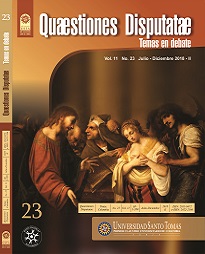Editorial
##plugins.themes.bootstrap3.article.main##
Resumo
Atualmente, a sociedade é caracterizada por sistemas complexos, nos quais a tecnologia, a facilidade de acesso à informação e até mesmo o uso crescente de redes sociais deram lugar a novas ideologias e subculturas; alguns deles linha positivista com tendência unívoca e outras uma linha relativista pós-moderna, típica da hermenêutica equívoca; que tornam essencial a geração de uma consciência crítica e pró-ativa; que permite o que, nas palavras do dominicano Mauricio Beuchot, é a existência de uma 14hierarquia de abordagens a uma verdade delimitada ou delimitável.Nesse sentido, é necessário reconhecer a íntima relação que existe entre educação e filosofia para desenvolver, durante o processo educativo, o fortalecimento do pensamento filosófico que favorece uma prática educativa coesa com o tecido social, sem ter a concepção de "o mundo moderno é o do simulacro", que, como Deleuze propôs com o princípio da conexão e heterogeneidade," qualquer ponto pode ser conectado a outro, e deve ser ";quer dizer, a teoria e prática não podem ser separadas umas das outras, elas devem sempre atender e responder a uma realidade.A realidade e sua cotidianidade exigem reflexão, porque não podemos ser indiferentes a ela, ao mesmo tempo em que impelimos uma ação, típica da atitude natural do ser humano, a questionar e tentar responder suas perguntas; Como disse Aristóteles, "todos os homens naturalmente querem saber". Portanto, o desenvolvimento do pensamento filosófico, busca gerar um cenário para responder a novos problemas e questões, considerando a diversidade cultural, seu plexo de valores, linguagens e ideologias.Bauman afirma que "nossa época, a época do pluralismo cultural, oposta à pluralidade da cultura, não é um tempo de niilismo", é importante que o processo educacional seja fortalecido de maneira a estimular a reflexão crítica, uma função do filosofia, tão desvalorizada na atual sociedade de consumo; isso, refletido na busca por satisfação momentânea, fornecendo respostas que terminam em relativismo ou materialismo. Retomar, então, a visão antropológica da função da filosofia na educação, que contempla o homem de forma integral, sem reducionismo, englobando a totalidade da vida, levando-o a atuar em um ideal de liberdade.No pensamento de Paulo Freire, para alcançar uma educação autenticamente libertadora, é necessário fazer e viver o dinamismo do espírito filosófico na educação, sem a necessidade de informações tendenciosas, o mais bem requere de se misturar com a realidade, onde o saber educacional facilita o diálogo, como método de transformar o que é considerado a causa opressora. Nesse sentido, a educação e a filosofia se unem infalivelmente, é assim que o conhecimento e a ciência podem ser considerados como um produto da interação e da implicação entre a reflexão filosófica do sujeito e da realidade, o que Dewey define como filosofia pragmática, referindo-se a intencionalidade do aluno por conhecer, que é motivada pela interação com o ambiente.A Revista Quaestiones Disputatae - Tópicos em Debate, mais uma vez, apresenta os resultados dos processos de pesquisa, com o objetivo de contribuir para a construção do conhecimento científico no campo das ciências humanas e sociais, nesta oportunidade, abordando diversos temas que convidam a reflexão e análise sobre a importância do ensino da filosofia e suas contribuições para a realidade social.
##plugins.themes.bootstrap3.article.details##
Como Citar
Hernández Tarazona,O.P., F. J. G. (2018). Editorial. Quaestiones Disputatae: Temas En Debate, 11(23), 12-19. Recuperado de http://revistas.ustatunja.edu.co/index.php/qdisputatae/article/view/1652
Seção
Editorial Vol. 11
De acuerdo a la Licencia Creative Commons Atribución-No Comercial-Sin Derivar 4.0 Internacional, se autoriza leer, descargar, copiar, distribuir, imprimir, buscar o enlazar los textos completos de estos artículos, siempre y cuando se conceda el crédito a los autores de los textos y a la Revista Quaestiones Disputatae: temas en debate, como fuente de publicación original. No se permite el uso comercial de copia o distribución de contenidos, así como tampoco la adaptación, derivación o transformación alguna de estos sin la autorización previa de los autores y de la dirección de Quaestiones Disputatae: temas en debate.

Esta obra está bajo una licencia de Creative Commons Reconocimiento-NoComercial-SinObraDerivada 4.0 Internacional.
Referências
Mauricio Beuchot, O.P., “Hermenéutica analógica y crisis de la modernidad”, Biblioteca Virtual Universal, 2003.
Gilles Deleuze, Différence et répétition, PUF, París, 1997.
Gilles Deleuze – Félix Guattari, Mille plateaux, París, 2004.
Zygmunt Bauman, La cultura como praxis, Barcelona; Paidós, 2002.
Paulo Freire, La pedagogía del oprimido, Buenos Aires, Editorial Siglo XXI, 1985.
Emma Pazmiño A, Relación, interacción e implicación entre la filosofía y la educación, 2008 [en línea] disponible en file:///C:/Users/secretaria.adcon/Downloads/Dialnet-RelacionInteraccion EImplicacionEntreFilosofiaYEduc-5973021.pdf [accesado el 20 de septiembre de 2018].
John Dewey, Experiencia y educación. Buenos Aires, Editorial Losada, 1967.
Gilles Deleuze, Différence et répétition, PUF, París, 1997.
Gilles Deleuze – Félix Guattari, Mille plateaux, París, 2004.
Zygmunt Bauman, La cultura como praxis, Barcelona; Paidós, 2002.
Paulo Freire, La pedagogía del oprimido, Buenos Aires, Editorial Siglo XXI, 1985.
Emma Pazmiño A, Relación, interacción e implicación entre la filosofía y la educación, 2008 [en línea] disponible en file:///C:/Users/secretaria.adcon/Downloads/Dialnet-RelacionInteraccion EImplicacionEntreFilosofiaYEduc-5973021.pdf [accesado el 20 de septiembre de 2018].
John Dewey, Experiencia y educación. Buenos Aires, Editorial Losada, 1967.

